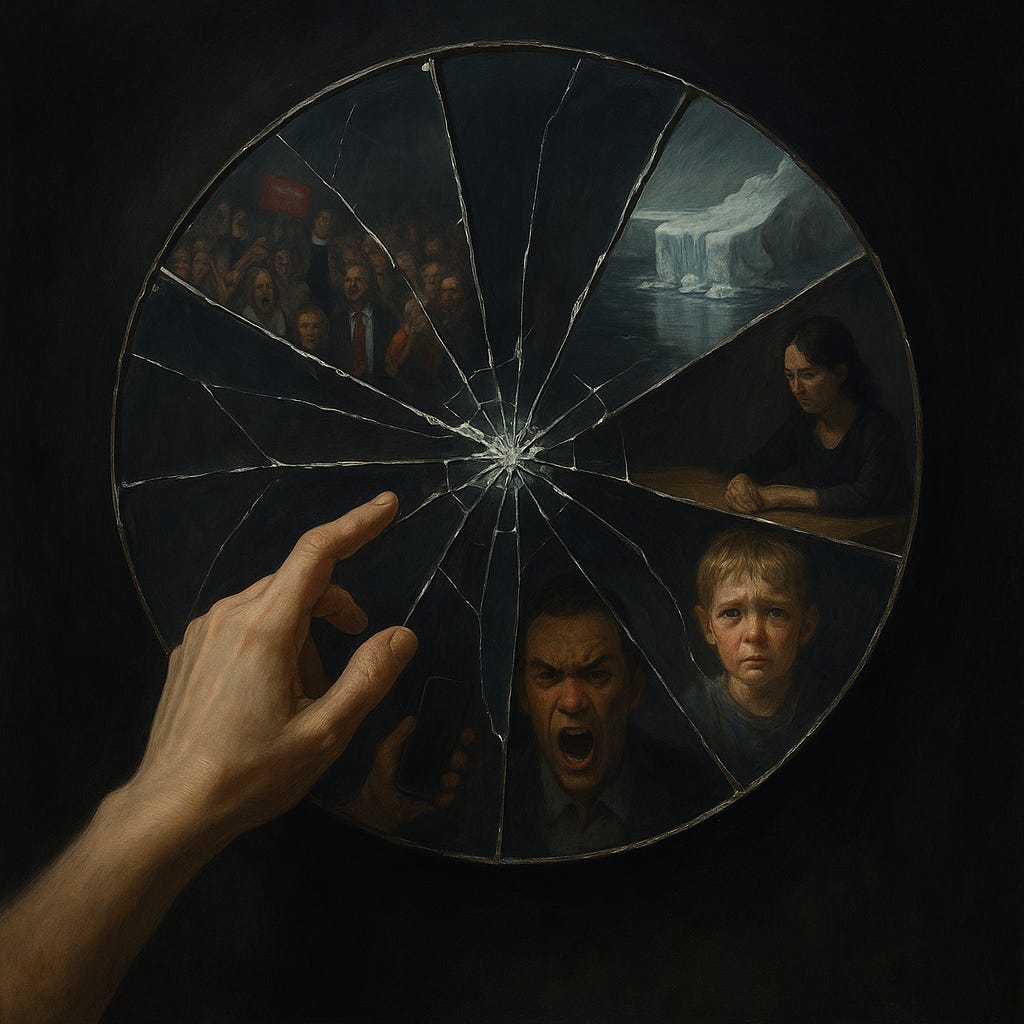Daily, we are confronted with a harsh mirror - a distorted reflection, perhaps, but one that reveals more than we might like to see. A culture obsessed with image over essence. Transaction over trust. Assertiveness over dialogue. Control over care.
It’s jarring. At times, even repulsive. And yet - this may be the point.
We need mirrors, especially the uncomfortable kind. They show us not just what’s gone wrong out there, but who we’ve become in here. They force us to reckon with what we've created, what we’ve ignored, and where we’ve become complicit.
Leaders who embody domination over dialogue - and the movements that rally behind them - are not outliers. They are symptoms. Cultural expressions of a deeper, collective wound. They echo the very foundations of modern life: one-way relating, disconnection from context, and the slow erosion of shared meaning.
This is what happens when agency is severed from empathy. When power is unmoored from consequence. These aren't deviations from the norm; they are its logical conclusion.
But it doesn’t have to stay this way.
Moments like these - however unsettling - offer a choice point. A rare opportunity to pause, reflect, and ask: What have we forgotten? What have we sacrificed in the name of progress or success? What truths have we exiled in our race to dominate, to win, to be right?
This is where integration begins. By facing the discomfort. Leaning into the tension. And choosing differently.
Choosing to return to relationship.
To slow down. To listen. To feel again. To reweave what’s been torn - not just politically, but spiritually, ecologically, relationally. This is the essence of both our inner and outer work. To see ourselves honestly - and still move toward love. Because only when we reconcile with who we’ve become can we begin to imagine - and embody - who we might yet be.
But becoming who we’re truly meant to be doesn’t come without cost. When we step more fully into our potential - when we move toward authenticity, depth, and meaningful contribution - we inevitably encounter envy.1 Our very becoming can stir discomfort in others, reflecting back what they have not yet dared to claim within themselves. And if we’re honest, we confront envy within ourselves, too - when we see others living freely or courageously in ways we haven’t yet allowed.
This is part of the terrain of transformation.
When we walk the path of becoming, we leave behind the false safety of fitting in, of appeasing the status quo. We begin to live in alignment with our highest inner truth, and that will provoke resistance - both around us and within us.
But this is also how we grow.`
Because the future is not asking us to be perfect. It is asking us to be honest. To live with integrity. To remember that leadership - true leadership - begins with how we relate: to ourselves, to one another, and to the world we’re shaping together.
And so we return, again and again, to love. Not as sentiment, but as the animating force that calls us to become more whole, more real, more true.
Even when it costs us. Especially when it costs us.
Because this is what transformation requires. And this is how a culture begins to heal.
Hanzi Freinacht in Nordic Ideology (2019) reminds us that we are entering an era in which our very potentiality - our capacity to become - is what we strive for and begin to inhabit. But with this comes a shadow: envy.
When the ego lays hold of our uniqueness, it can distort it into grandiosity - a performance of greatness rather than an expression of true depth. What we must painstakingly learn is that grandeur is not the same as grandiosity. One is rooted in soul, the other in self-inflation.
Our current world reveals this distinction with stunning clarity. And our hearts, if we listen closely, know the difference.




Maybe it is an outcome of being in a more and more close-knit relational field with you, Claudia... I just posted an article that I find strangely triangulating in the same direction as your writing... And I find a lot of resonance with your perspective: yes, we have "collectively" (but each of us individually) worked very hard on becoming skilled at "winning" the transactional game -- only to find that the game cannot be won that way. Or rather, too much winning destroys the board (the field) on which can play to begin with. If we do not soon realize how to properly tend to that field, that part of reality which allows us to play with one another to begin with, it may all fall apart. There is immense sadness in me on pondering this thought, but also genuine hope, because it means I *can* see the reality being threatened. And part of the hope is that WE can communicate to others around us how to bring this reality into their awareness, so as to help us all move away from the "having-to-win addiction" that seems to be going around these days...
Yes, let us together "reweave what’s been torn"